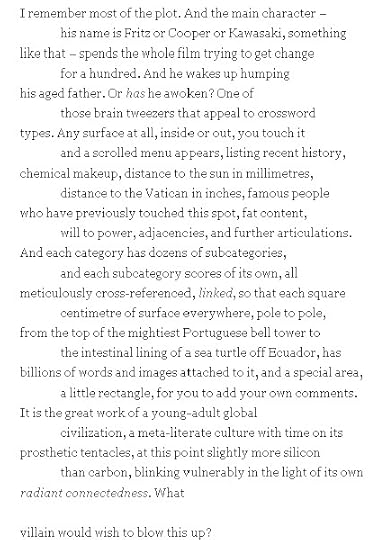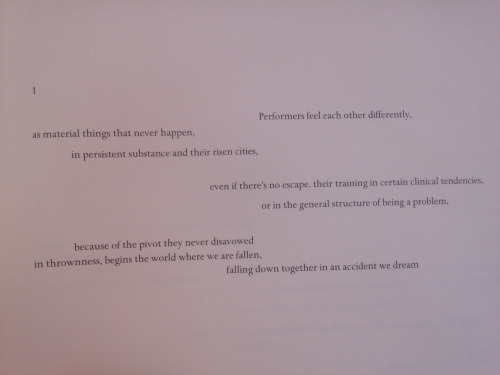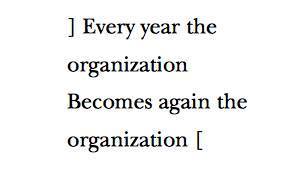Mat Laporte's Blog, page 35
April 27, 2015
arise! dream the occasion.while the city sleepsthe rest of you, inked, will die.awaken what years...
arise! dream the occasion.
while the city sleeps
the rest of you, inked, will die.
awaken what years ago
was called love.
we should have each other.
imagination + daring action.
we slip transformed
broken into beauty and joy.
from All is not yet lost by Betsy Fagin
April 22, 2015
heddabee:
21
As long as necessity is socially dreamed, dreaming will remain necessary. The...
21
As long as necessity is socially dreamed, dreaming will remain necessary. The spectacle is the bad dream of a modern society in chains and ultimately expresses nothing more than its wish for sleep. The spectacle is the guardian of that sleep.
–Guy DeBord, The Society of the Spectacle - Chapter 1: Separation Perfected
lostcoherence:
Collective Head: Fred Moten at NYU’s Living...
Collective Head: Fred Moten at NYU’s Living Labor: Marxism and Performance Studies Conference
Critical theorist, educator, and poet Fred Moten delivers a keynote at the 2014 conference “Living Labor: Marxism and Performance Studies” at the Performance Studies department at New York University. The talk is within the closing plenary at the conference that is dedicated to the late José Esteban Muñoz—a colleague and comrade of many of the conference participants. Accordingly, the last third of Moten’s reflections address Muñoz’s thought on queer futurity and its immanence in the present. In line with the title, taken from Lygia Clark’s 1975 performance Cabeza colectiva, the talk is constructed in the form of a prismatic dialogue. Moten quotes extensively from the writings of Masao Miyoshi and Karl Marx to establish his main lines of inquiry: what would be a materialization of social wealth that was not circumscribed by forms of property and the drive to accumulate? Here, Moten calls on Marx’s description in the Grundrisse of how the contemporary mode of production elaborates human potentiality by, paradoxically, emptying it out: “the complete working-out of the human content appears as a complete emptying-out, this universal objectification as total alienation, and the tearing-down of all limited, one-sided aims as sacrifice of the human end-in-itself to an entirely external end.” How can we imagine the common as that which is “before”—in time and in space, that is, behind as well as in front—and which surrounds us even as our social structures cast it out, as an externality or as a periphery? How could architecture find itself “re-materialized” through the encounter with the “space outside” and all those who inhabit it? As Craig Buckley has written, “the surfaces of daily life [come] to appear as traces of largely unseen apparatuses whose implications architecture still struggles to grasp.” Moten asks what comes after a modernism that strove to accommodate the city’s outside—the poor—however imperfectly, in an era when social housing is seen not “as an object of planning but an object of demolition”?
The aesthetic dimension of anti-coloniality as an ongoing mode of resistance in contemporary life, its “sentimentality,” is developed as counter to critical fascination with power and its bleak anatomies, a thread that could be considered definitive to Moten’s work. The necessity of getting lost, of unmooring from the property-form of subjectivity, is seen as central to queer futurity, which exists by displacement. Loss is the instantiation of another condition of possibility, notes Moten in an affecting tribute to both the work of José Esteban Muñoz and his living absence.
Fred Moten has developed a singular body of work in the terrain of black studies, focusing mainly on African-American literature, music and performance, and weaving that with critical (race) theory and Marxism in the “black radical tradition” (Cedric Robinson). He teaches at University of California, Riverside and Duke University and is the author of In the Break: The Aesthetics of the Black Radical Tradition (University of Minnesota Press, 2003), The Undercommons: Fugitive Planning and Black Study, with Stefano Harney (Minor Compositions, 2013), and numerous books of poetry.
Marina Vishmidt’s contribution concerns the relationship between affirmation and negation in the political imagination.
lazz:
fred moten, feel trio
FiNaL Zine PDF .pdf - PDF Archive
ANTEPARTUM, MOTHER SHEEP by sarah ruppThis is my project/zine/chapbook of the poems I wrote everyday on facebook in the last 21 days, also includes a poem Maya Weeks wrote in response to one of my poems and a manifesto on communist poetics that i feel really good about. if you want a physical copy, email sarahrupp2011@gmail.com
April 21, 2015
Mat Laporte's Blog
- Mat Laporte's profile
- 21 followers









